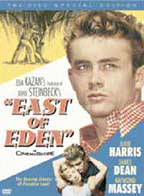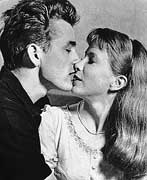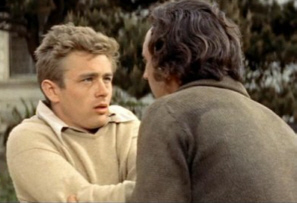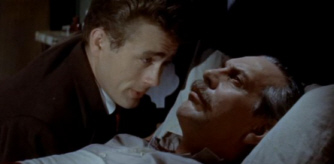 James Dean gives an exceptional performance in this now classic film of John Steinbeck’s classic novel of the same name. A movie well worth seeing, “ East of Eden”, with a strong supporting performance from Julie Harris as Abra, shows off Jimmy Dean with sophistication and poise in his “rebel” character. Presented as one of a trilogy of films directed by Elia Kazan on TVO’s Saturday Night at the Movies.
James Dean gives an exceptional performance in this now classic film of John Steinbeck’s classic novel of the same name. A movie well worth seeing, “ East of Eden”, with a strong supporting performance from Julie Harris as Abra, shows off Jimmy Dean with sophistication and poise in his “rebel” character. Presented as one of a trilogy of films directed by Elia Kazan on TVO’s Saturday Night at the Movies.
Video preview from TVO here.
Paradise Lost
They were at it again - my two munchkins brawling in the backseat: “She did it to me first!” – “But he said that I was a . . .” – “She has her stuff on my side!” – And on and on it goes. Often enough it comes to blows before the emotions of the moment blow over. Sibling rivalry, common enough phenomenon that it is, can be so draining for a parent.
And then there is all the relationship stuff about working through wrongdoing, repentance, forgiveness and reconciliation. It’s amazing how many times we go through it. My daughter is especially prone to veering off the straight and narrow in a fit of temper that needs a course correction along the way.
She climbs up on my knee after a particularly stormy session and we talk calmly about what has happened. In those moments, she needs me to tell her once again that Mommy loves her no matter what she does. We try to talk about what a new and brighter future will look like, avoiding the mistakes of the past. Kisses and hugs and reassuring words follow in abundance. It’s all a part of growing up.
At least it is for my kids. When my son gets his feelings hurt in the latest spat with his sister or in some confrontation with his parents, he just runs off to his room. The stakes were considerably higher in the film, East of Eden .
 As a story about the conflicts of emerging adults, sibling rivalry in the case of Cal and Aron Trask involves slightly more serious consequences. After feeling betrayed by his girlfriend’s shifting allegiances and the earth shattering revelations of his brother concerning their mother’s true identity, Aron runs off to enlist in World War I, presumably to his death on some European front of military action.
As a story about the conflicts of emerging adults, sibling rivalry in the case of Cal and Aron Trask involves slightly more serious consequences. After feeling betrayed by his girlfriend’s shifting allegiances and the earth shattering revelations of his brother concerning their mother’s true identity, Aron runs off to enlist in World War I, presumably to his death on some European front of military action.
The characters of East of Eden, although they do have the archetypal thing going on, appear to be more fully developed than cardboard cut-out characters of “the good son” and the “the bad son”. Just about everyone, it seems, is more than who they appear to be at first. The father, Adam, a cold and distant figure, is more complex and compassionate than we think at first. The mother, Kate, while still a hardened brothel madame, shows perhaps just a chink in her steely armour which allows for a slight hint of humanity to leak out.
 An attempt is made to maintain the epic sweep of the original Steinbeck story through the use of cinemascope. With our rinky-dink 13 inch television screen with bunny ear reception, one has to use quite a bit of imagination to “get the full effect” of the wide-screen experience as it was originally conceived of for the movie theatre. I’m afraid that on only 13 inches worth of screen, the cropped look of cinemascope just ends up being a small and squinty annoyance. It is involvement with the storyline and the thematic material keep the “epic effect” alive for me.
An attempt is made to maintain the epic sweep of the original Steinbeck story through the use of cinemascope. With our rinky-dink 13 inch television screen with bunny ear reception, one has to use quite a bit of imagination to “get the full effect” of the wide-screen experience as it was originally conceived of for the movie theatre. I’m afraid that on only 13 inches worth of screen, the cropped look of cinemascope just ends up being a small and squinty annoyance. It is involvement with the storyline and the thematic material keep the “epic effect” alive for me.
And there is more than enough of that kind of stuff to go around. Allusions hearken back to the biblical Cain and Abel story. An attempt is made to delve into the origins of human behaviour and human nature. Cal Trask, in trying to figure out who he is and why he is the way he is, takes  us all on a journey to the outer reaches of the human soul. We see Cal develop from a brooding, reactive youth and evolving into the first steps of responsible adulthood by the end of the film.
us all on a journey to the outer reaches of the human soul. We see Cal develop from a brooding, reactive youth and evolving into the first steps of responsible adulthood by the end of the film.
In the end, Cal quotes some of the good stuff that he got from his dad and demonstrates that he is, in some measure, trying to put it into practice: “A man has a choice and it’s a choice that makes him a man.”
 Cal chooses to stay with his ailing dad in his final days instead of just making the easy choice to “take the money and run”.
Cal chooses to stay with his ailing dad in his final days instead of just making the easy choice to “take the money and run”.
Funny that. One of Adam Trask’s less than shining moments revolves around the reading of Psalm 32 at the dinner table. Cal reads the Scriptures aloud with a defiant emphasis on reading out the verse numbers. (His father, Adam, repeatedly tells him this is not necessary.) Because the focus of the moment is on the relational conflict between the father and the son and all of their unresolved issues, the way Cal reads the psalm aloud becomes more important in this scene than anything that the Scriptures actually have to say. Bible reading becomes background noise; a device for illustrating the emotional tone of the dramatic conflict.
 An irony is of course intended by the author, Steinbeck. This particular psalm is actually the recounting of a very passionate and emotional experience of personal forgiveness and reconciliation on the part of the psalmist. It’s not just a droning background noise of boring and irrelevant “religious speak” as Cal hears it to be. The psalm depicts in ancient poetry the very thing that is obviously missing in the modern day experiences of the film’s characters. Unfortunately, Cal stops at verse 8 and never gets to verses 9 and 10. He is distracted by his dysfunctional relationship with his father. Dean’s character might get to that point later in the film, but for Cal it had nothing to do with reading or understanding the bible. It’s a secular redemption story in operation in this film, making use of biblical language and concepts as a backdrop.
An irony is of course intended by the author, Steinbeck. This particular psalm is actually the recounting of a very passionate and emotional experience of personal forgiveness and reconciliation on the part of the psalmist. It’s not just a droning background noise of boring and irrelevant “religious speak” as Cal hears it to be. The psalm depicts in ancient poetry the very thing that is obviously missing in the modern day experiences of the film’s characters. Unfortunately, Cal stops at verse 8 and never gets to verses 9 and 10. He is distracted by his dysfunctional relationship with his father. Dean’s character might get to that point later in the film, but for Cal it had nothing to do with reading or understanding the bible. It’s a secular redemption story in operation in this film, making use of biblical language and concepts as a backdrop.
 I happened to read psalm 32 a few evenings before I chanced to see this film. My personal experience of reading the psalm again was very different from the “disembodied” version presented in the film. It was very striking to hear these words repeated a couple of days later and put to a very different use by Elia Kazan et al.
I happened to read psalm 32 a few evenings before I chanced to see this film. My personal experience of reading the psalm again was very different from the “disembodied” version presented in the film. It was very striking to hear these words repeated a couple of days later and put to a very different use by Elia Kazan et al.
Ain’t that the way things go? It reminds me of our most recent family bible reading attempt around the Sunday dinner table. In spite of our best efforts to connect and pass on a significant spiritual heritage to our offspring, one kid was standing on her head in her chair and the other petulantly kept asking to play the “game” we did two weeks ago as part of our family time (a game which involved much throwing of teddy bears at each other by way of “spiritual illustration through kinaesthetic action” – it was very popular at the time.).
Sigh. Not much seemed to be getting through. Oh well. So much for transmitting a godly heritage, at least for that particular day. It’s a good thing you get more than one chance at attempting to be a good parent.
 I’m very glad to have finally seen the famous “East of Eden ” in the James Dean trilogy. It was also nice to see the other two Elia Kazan offerings “Viva Zapata” and “A Steetcar Named Desire” on the same night, thanks to TVO. It was definitely a treat.
I’m very glad to have finally seen the famous “East of Eden ” in the James Dean trilogy. It was also nice to see the other two Elia Kazan offerings “Viva Zapata” and “A Steetcar Named Desire” on the same night, thanks to TVO. It was definitely a treat.
Suggested Reading:
-
Fimlmcritic.com on the Method of the Method Actor
-
Refresh my memory on that weird Cain and Abel thing that was happening back there.
-
Forgiveness hurts . . .and heals
-
“Where ya headed Jimmy Dean?”
-
Elia Kazan directed this 2 hour picture to great effect. But who’ve you got in the director’s chair of your life production right now?
Venia: Father and son, a modern-day parable on forgiveness